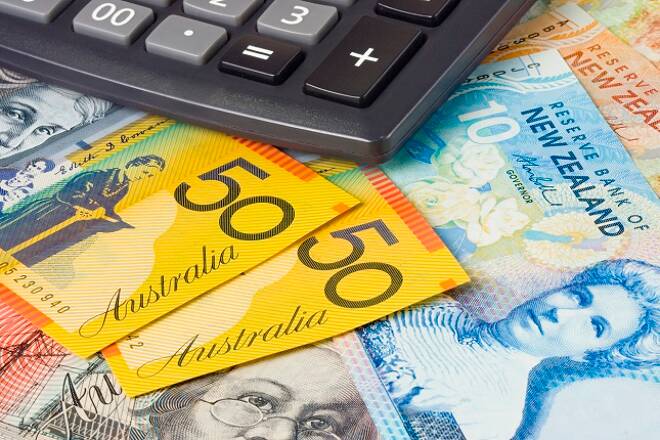Advertisement
Advertisement
Surging US Treasury Yields Putting the Heat on Aussie, Kiwi
By:
In Australia, investors are wagering the Reserve Bank (RBA) will have to follow the Fed and the RBNZ, and raise rates sooner than expected.
The Australian and New Zealand Dollars are trading mixed early Wednesday after posting a steep loss the previous session. The weakness was fueled by soaring U.S. Treasury yields that made the U.S. Dollar a more attractive asset and downbeat domestic data that put a question mark over expectations for strong economic recoveries this year.
At 04:16 GMT, the AUD/USD is trading .7185, down 0.0001 or -0.01% and the NZD/USD is at .6783, up 0.0013 or +0.18%. On Tuesday, the Invesco CurrencyShares Australian Dollar Trust ETF (FXA) settled at $71.20, down $0.38 or -0.53%.
Benchmark 10-year Treasury Yields Hit 2-Year High, Sitting Just Under 1.900%.
The U.S. Dollar was underpinned against its Australian and New Zealand counterparts on Tuesday as the benchmark U.S. 10-year Treasury yield jumped to its highest point in two years, hovering around 1.883% late in the session.
The move, which comes after a market holiday in the U.S. Monday, indicates that investors are preparing for the possibility of more aggressive tightening by the Federal Reserve.
New Zealand Business Outlook and Demand Weakens in Q4
New Zealand business confidence and demand dropped in the fourth quarter of last year as the COVID-19 outbreak dragged on, a private think tank said on Tuesday.
A net 28.0% of firms surveyed expected general business conditions to deteriorate compared with 11% pessimism in the previous quarter, the New Zealand Institute of Economic Research’s (NZIER) quarterly survey of business opinion (QSBO) showed.
On a seasonally adjusted basis, 34% expected business conditions to worsen, versus 11.0% pessimism recorded in the previous period. The survey’s measure of capacity utilization dipped to 89.5%, from the previous quarter’s 96.1%.
Australian Consumers Shell-Shocked as Omicron Hits Spending, Growth
Australian consumer confidence took a battering last week as an explosion in coronavirus cases triggered self-imposed lockdowns, squashing spending and blowing holes in supply chains.
A survey from ANZ out on Tuesday showed its measure of consumer sentiment slid 7.6% last week to its lowest since October 2020, lower even than during the Delta variant surge when much of the country was officially locked down.
Short-Term Outlook
Inflation pressures in New Zealand are accelerating, suggesting a continued tightening of monetary policy by the central bank. The Reserve Bank (RBNZ) raised interest rates for the second straight month in November to keep surging consumer prices in check and warned of more hikes.
In Australia, investors are wagering the Reserve Bank (RBA) will have to follow the Fed and the RBNZ and raise rates, even though policy makers have long argued that any move was unlikely this year.
Futures imply a 77% chance the RBA will lift rates to 0.25% as early as May, and hike no less than five times this year to 1.25%.
The key will be consumer price figures for the December quarter due next week where some analysts are tipping another outsized rise in core inflation.
For a look at all of today’s economic events, check out our economic calendar.
About the Author
James Hyerczykauthor
James Hyerczyk is a U.S. based seasoned technical analyst and educator with over 40 years of experience in market analysis and trading, specializing in chart patterns and price movement. He is the author of two books on technical analysis and has a background in both futures and stock markets.
Advertisement
